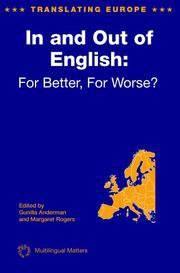| Listing 1 - 9 of 9 |
Sort by
|
Book
ISBN: 9025411312 Year: 1995 Publisher: Amsterdam Contact
Abstract | Keywords | Export | Availability | Bookmark
 Loading...
Loading...Choose an application
- Reference Manager
- EndNote
- RefWorks (Direct export to RefWorks)
Lexicology. Semantics --- Indonesian languages --- Dutch language --- Comparative linguistics --- Pragmatics --- Indonesische taal --- Nederlandse taal --- etymologie --- leenwoorden uit het Nederlands --- leenwoorden uit het Indonesisch --- etymologie. --- leenwoorden uit het Nederlands. --- leenwoorden uit het Indonesisch. --- Etymologie. --- Leenwoorden uit het Nederlands. --- Leenwoorden uit het Indonesisch. --- Indonesian language --- Bahasa Indonesia --- Malayan languages --- Malay language --- Flemish language --- Netherlandic language --- Germanic languages --- Foreign words and phrases&delete& --- Indonesian --- Dutch --- Foreign words and phrases
Book
ISBN: 2747514013 8887605645 9782747514019 Year: 2001 Publisher: Paris: L'Harmattan,
Abstract | Keywords | Export | Availability | Bookmark
 Loading...
Loading...Choose an application
- Reference Manager
- EndNote
- RefWorks (Direct export to RefWorks)
Francais (Langue) --- Emprunts arabes --- Franse taal --- arabismen --- woordenboeken --- leenwoorden uit het Arabisch --- woordenboeken. --- Arabismen --- Woordenboeken. --- Leenwoorden uit het Arabisch --- Francais (Langue) - Emprunts arabes - Glossaires, vocabulaires, etc.
Book
ISBN: 9025424503 9789025424503 Year: 1998 Publisher: Amsterdam Contact
Abstract | Keywords | Export | Availability | Bookmark
 Loading...
Loading...Choose an application
- Reference Manager
- EndNote
- RefWorks (Direct export to RefWorks)
Lexicology. Semantics --- Dutch language --- Nederlandse taal --- etymologie --- leenwoorden --- Language and languages --- Influence --- Foreign words and phrases --- #A9901A --- #KVHA:Leenwoorden. Woordenboeken. Nederlands --- 801.315 --- 803.93-3 --- 803.93-54 --- -Language and languages --- -#KVHA:Taalhistorisch. Woordenboeken. Nederlands; verklarende --- Foreign languages --- Languages --- Anthropology --- Communication --- Ethnology --- Information theory --- Meaning (Psychology) --- Philology --- Linguistics --- Flemish language --- Netherlandic language --- Germanic languages --- Leenwoorden --- Nederlands: lexicografie --- Nederlands: etymologie --- etymologie. --- leenwoorden. --- 803.93-54 Nederlands: etymologie --- 803.93-3 Nederlands: lexicografie --- 801.315 Leenwoorden --- Etymologie. --- Leenwoorden. --- #KVHA:Taalhistorisch. Woordenboeken. Nederlands; verklarende --- International words --- Loan words --- Loanwords --- Foreign elements --- Dutch language - Influence --- Language and languages - Foreign words and phrases --- Emprunts étrangers (linguistique) --- Emprunts néerlandais

ISBN: 2221082753 9782221082751 Year: 1997 Publisher: Paris Laffont
Abstract | Keywords | Export | Availability | Bookmark
 Loading...
Loading...Choose an application
- Reference Manager
- EndNote
- RefWorks (Direct export to RefWorks)
En linguiste qui ne perd jamais son sens de l'humour, Henriette Walter multiplie les exemples, les anecdotes, les détails piquants pour faire de cette histoire des mots français venus d'ailleurs une aventure peu commune. Qui penserait attribuer une origine étrangère à des mots comme jupe, épinard, braguette, violon ou encore sentimental ? Et pourtant, jupe vient de l'arabe, épinard du persan, braguette du gaulois, violon de l'italien et - qui l'eût cru ? - l'adjectif sentimental nous est venu du latin, mais par l'anglais. Si l'on sait bien que la langue française est issue du latin, on oublie souvent qu'elle s'est enrichie au cours de sa longue histoire de milliers de mots venus des quatre coins du monde : du grec, du celtique, du francique, mais aussi de l'italien, de l'anglais, de l'espagnol, du portugais et encore de l'arabe, du persan, du turc, du japonais, et des langues amérindiennes ou africaines. Henriette Walter raconte l'histoire de ces mots, de ces vagues d'immigration parfois clandestines qui ont petit à petit donné des couleurs à la langue française.
French language
---
Etymology
---
Français (Langue)
---
Foreign words and phrases.
---
Word formation.
---
Emprunts
---
Formation des mots
---
Etymologie
---
Linguistique
---
Langage
---
Langue
---
Foreign words and phrases
---
Word formation
---
804.0-54
---
804.0-3
---
-French language
---
-#BIBC:ruil
Book
ISBN: 9013005535 Year: 2003 Publisher: Alphen aan den Rijn Kluwer
Abstract | Keywords | Export | Availability | Bookmark
 Loading...
Loading...Choose an application
- Reference Manager
- EndNote
- RefWorks (Direct export to RefWorks)
-5
Nederlandse spelling. --- Leenwoorden. --- Orthography --- Dutch language --- Nederlandse spelling --- Spelling --- Taal --- Nederlands --- 803.93-1 --- 801.5 --- 643 Taalzorg --- #KVHA:Spelling; Nederlands --- spelling --- *842 --- Medeklinkers --- 801.5 Grammatica --- Grammatica --- 803.93-1 Nederlands: spelling --- Nederlands: spelling --- Monograph --- Therapie --- Dialect --- Etymologie --- Fonetiek --- Idioom --- Zinsleer --- Linguïstiek --- Kleuter --- Geschiedenis --- Spraaktechnologie --- Vlaams --- Vlaanderen --- Emigratie
Book
ISBN: 9783110218435 3110218437 9786612714764 3110218445 1282714767 9783110218442 9781282714762 661271476X Year: 2009 Publisher: Berlin Mouton de Gruyter
Abstract | Keywords | Export | Availability | Bookmark
 Loading...
Loading...Choose an application
- Reference Manager
- EndNote
- RefWorks (Direct export to RefWorks)
This book is the first work to address the question of what kinds of words get borrowed in a systematic and comparative perspective. It studies lexical borrowing behavior on the basis of a world-wide sample of 40 languages, both major languages and minor languages, and both languages with heavy borrowing and languages with little lexical influence from other languages. The book is the result of a five-year project bringing together a unique group of specialists of many different languages and areas. The introductory chapters provide a general up-to-date introduction to language contact at the word level, as well as a presentation of the project's methodology. All the chapters are based on samples of 1000-2000 words, elicited by a uniform meaning list of 1460 meanings. The combined database, comprising over 70,000 words, is published online at the same time as the book is published. For each word, information about loanword status is given in the database, and the 40 case studies in the book describe the social and historical contact situations in detail. The final chapter draws general conclusions about what kinds of words tend to get borrowed, what kinds of word meanings are particularly resistant to borrowing, and what kinds of social contact situations lead to what kinds of borrowing situations.
Language and languages --- Foreign words and phrases --- Taal en talen --- Foreign words and phrases. --- leenwoorden uit vreemde talen. --- vreemde woorden. --- Lexicology. Semantics --- Comparative linguistics --- Foreign elements. --- International words --- Loan words --- Loanwords --- Foreign elements --- Language and languages - Foreign words and phrases --- Historical Linguistics. --- Language Change. --- Lexicology.
Book
ISBN: 9783110235647 3110235641 9786613165589 1283165589 311023565X 9783110235654 1283858142 9781283858144 9783110288414 3110288419 3110288427 9783110288421 Year: 2011 Publisher: Berlin de Gruyter
Abstract | Keywords | Export | Availability | Bookmark
 Loading...
Loading...Choose an application
- Reference Manager
- EndNote
- RefWorks (Direct export to RefWorks)
Das Buch möchte einerseits wichtige Ergebnisse der Fremdwortforschung zum Deutschen zusammenfassen und entwickeln, indem Phonologie, Orthographie, Flexion und Wortbildung einschl. der Lehnwortbildung für die Gräkolatinismen, Gallizismen und Anglizismen auf dem Hintergrund der Wortgrammatik des Kernwortschatzes dargestellt werden. Auf diese Weise wird es möglich, semantische und vor allem strukturelle Fremdheitsmerkmale zu identifizieren, so dass auch Einzelheiten von Integrationsprozessen in Richtung Kernwortschatz zugänglich werden. Innerhalb dieser Systematik kommt es darauf an, die Charakteristika der einzelnen Großklassen von Fremdwörtern herauszustellen. Die systematische Beschreibung macht den zweiten Hauptteil des Buches aus. Im ersten Hauptteil werden ebenso ausführlich die Hauptthemen des öffentlichen Fremdwortdiskurses und seine historischen Grundlagen abgehandelt. Dazu gehört einmal die Geschichte der Entlehnungen aus den wichtigsten Gebersprachen Englisch, Französisch, Italienisch, Lateinisch und Griechisch. Dazu gehört weiter die Rolle des Deutschen als Nehmersprache. Spracheinstellungen, Purismus, Verdeutschungs- und Eindeutschungsbemühungen mit ihren Materialisierungen in Wörterbüchern kommen zur Sprache. Ein besonderes Anliegen besteht in der Vermittlung beider Hauptteile: Ständiger Begleiter der Darstellung bleibt die Frage, was in der Grammatik von Fremdwörtern aus ihrer Geschichte und Funktionalität aufgehoben ist.
German language --- Foreign words and phrases --- Duits. --- Leenwoorden. --- Foreign words and phrases. --- Lexicology. Semantics --- Allemand (Langue) --- Mots et locutions étrangers --- Duitse taal --- vreemde woorden. --- German language - Foreign words and phrases --- Borrowing. --- Linguistics. --- Loan Word. --- Morphology (Language). --- Orthography. --- Phonology. --- Purism (Language). --- Allemand (langue) --- Morphologie (linguistique) --- Emprunts étrangers

ISBN: 1853597872 1853597880 1853597899 1280739398 9786610739394 9781853597893 9781853597886 9781853597879 9781280739392 6610739390 Year: 2005 Publisher: Clevedon Multilingual Matters Ltd
Abstract | Keywords | Export | Availability | Bookmark
 Loading...
Loading...Choose an application
- Reference Manager
- EndNote
- RefWorks (Direct export to RefWorks)
In and out of English: For Better, For Worse? is concerned with the impact of English as the lingua franca of today’s world, in particular its relationship with the languages of Europe. Within this framework a number of themes are explored, including linguistic imperialism, change as the result of language contact, the concept of the English native speaker, and the increasing need in an enlarged Europe for translation into as well as out of English.
Translation science --- English language --- Sociolinguistics --- Translating and interpreting --- Languages in contact --- Anglais (Langue) --- Traduction et interprétation --- Translating. --- Influence on foreign languages. --- Europe. --- Traduction --- Influence sur les autres langues --- Europe --- Languages --- Foreign words and phrases --- English. --- 82.035 --- #KVHA:Taalwetenschap; Engels --- #KVHA:Historische linguistiek; Engels --- #KVHA:Vergelijkende linguistiek; Engels --- -English language --- -Translating and interpreting --- -428.02 --- Ab1 --- Germanic languages --- Interpretation and translation --- Interpreting and translating --- Language and languages --- Literature --- Translation and interpretation --- Translators --- Influence of English on foreign languages --- Literatuur. Algemene literatuurwetenschap--?.035 --- Translating --- Influence on foreign languages --- Council of Europe countries --- Eastern Hemisphere --- Eurasia --- Engelse taal --- Europese talen --- Taal en cultuur --- Taalcontact --- Vertalen --- Vertalen en cultuur --- Vertalen en interculturele communicatie --- Europa --- vertalen --- leenwoorden --- vreemde woorden --- English language. --- English language - Influence on foreign languages. --- Languages in contact. --- Translating and interpreting. --- English Language --- English --- Languages & Literatures --- Taal en cultuur. --- Vertalen en cultuur. --- Vertalen en interculturele communicatie. --- Europa. --- vertalen. --- leenwoorden. --- vreemde woorden. --- 82.035 Literatuur. Algemene literatuurwetenschap--?.035 --- Vertalen. --- Leenwoorden. --- Vreemde woorden. --- Traduction et interprétation --- 428.02 --- ELF. --- English as a lingua franca. --- influence of English. --- language and power. --- languages of Europe. --- linguistic imperialism. --- literary translation. --- translation studies.
Book
ISSN: 13740881 ISBN: 9782801114179 2801114170 Year: 2008 Volume: *32 Publisher: Bruxelles De Boeck
Abstract | Keywords | Export | Availability | Bookmark
 Loading...
Loading...Choose an application
- Reference Manager
- EndNote
- RefWorks (Direct export to RefWorks)
French language --- Sociolinguistics --- Leenwoorden. --- Frans. --- Engels. --- Taalpolitiek. --- Gegenwartssprache. --- Anglizismus. --- English language --- Français (Langue) --- Anglais (Langue) --- Foreign words and phrases --- English. --- Influence on French. --- Emprunts anglais --- Influence sur le français --- Französisch. --- English --- Influence on French --- 804.0 <09> --- 804.0-06 --- 804.0 <100> --- Frans. Franse taalkunde--Geschiedenis van ... --- Frans: taalzuiverheid; taalbeheersing --- Francofonie --- Français (Langue) --- Influence sur le français. --- Influence sur le français. --- Emprunts anglais. --- 804.0 <100> Francofonie --- 804.0-06 Frans: taalzuiverheid; taalbeheersing --- 804.0 <09> Frans. Franse taalkunde--Geschiedenis van ... --- Influence sur le français --- Französisch. --- Langue d'oïl --- Romance languages --- Germanic languages --- Foreign words and phrases&delete& --- Frans. Franse taalkunde--Geschiedenis van .. --- Anglicisms --- Sociolinguïstiek --- Franse taalkunde --- Lexicology. Semantics --- Frans. Franse taalkunde--Geschiedenis van . --- Frans. Franse taalkunde--Geschiedenis van --- French language - Foreign words and phrases - English --- English language - Influence on French
| Listing 1 - 9 of 9 |
Sort by
|

 Search
Search Feedback
Feedback About UniCat
About UniCat  Help
Help News
News